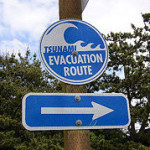 We have all watched the news today, and are overcome with sadness for the people of Japan who have been hit hard with this horrible natural disaster. While most of us live in places that will not be affected by a tsunami, we should all know what to do just in case the worst happens.
We have all watched the news today, and are overcome with sadness for the people of Japan who have been hit hard with this horrible natural disaster. While most of us live in places that will not be affected by a tsunami, we should all know what to do just in case the worst happens.
First of all, do you know what a tsunami is? By definition, a tsunami is a series of waves caused by a massive displacement of water. In general, tsunamis are not particularly threatening, as they constantly happen every day around the world. Most tsunamis don’t reach much higher than regular ocean waves on the beach. In some cases, the tsunami will develop into potentially destructive waves (such as it did after the Japan quake). It is common to believe that tsunamis are extremely high waves, but they don’t have to be notably high to cause substantial damage. If there is a tsunami warning in effect, it is probably because the tsunami is expected to be destructive.
1. Be aware of any warnings. If a warning has been issued in your area, be aware, and know what is going on. Tsunami warnings are usually issued several hours before the expected arrival time.
2. Be well informed. Always know what is going on with the tsunami, if the warning has been canceled, if there is information on mass evacuation plans, etc.
3. If evacuating, be frugal with what you take. Take only the essentials, food, water, and clothing (shelter, if necessary).
4. If staying, move to higher land, if necessary.
-Jessica Brown

















